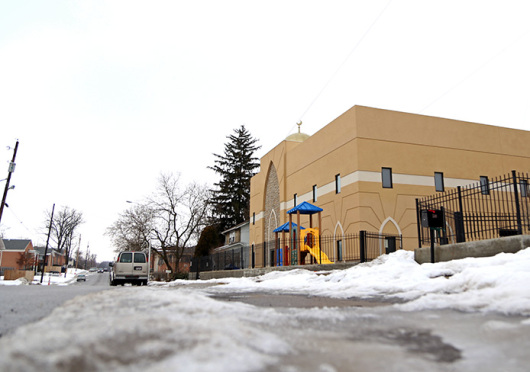
Masjid Omar Ibn El-Khattab, located at 580 Riverview Drive, was one of two Columbus-area mosques that received threatening phone calls in late February.
Credit: Mark Batke / Photo editor
Jana al-Akhras, a first-year law student, grew up going to Masjid Omar Ibn El-Khattab, a mosque less than a mile north of Ohio State’s campus. It was where her mom had weekly Islamic discussions, where she learned and developed her faith and where she and her friends would play on the monkey bars at the jungle gym.
In fact, as the first mosque in Columbus — built in 1984 — Masjid Omar is where many Muslim families grew up and built a community. The idea of the mosque’s origin began in 1979, when nine students met and agreed on praying at an apartment on Harley Drive, according to its website.
Today, it sees about 500 people each Friday for prayers, almost half of whom are students, said Basil Mohamed Gohar, president of the board of directors of Masjid Omar.
Now, the Muslim communities of Columbus and Ohio State are reacting to threatening phone calls that Masjid Omar and another anonymous Columbus mosque received on Feb. 20. Many members of the Muslim community said they are determined to live their lives as usual while tearing down the walls between Muslims and non-Muslims in America.
“For me, it’s just shocking,” said al-Akhras, who is a Columbus native. “I keep telling myself this isn’t Columbus. Columbus values diversity, Columbus values people with different faiths.”
As I listened to the voicemails that had been left at the mosques, chills ran down my spine. I had never heard so much hate in my life.
The caller aggressively spat out words of profanity, insults and threats, referring to Muslims as “Nazis,” “garbage” and “trash,” saying, “Lose your religion or lose everything.” He used racial slurs and threatened to bomb the mosques, saying people would be “scalded.”
Abdulrahman Alwattar, co-president of the Muslim Students’ Association at OSU and a fourth-year in public relations, echoed al-Akhras’ concerns.
“It’s pretty alarming and disappointing,” he said. “I feel like Columbus is a pretty open-minded place and a very great place to call my hometown. It’s disappointing to see people in the area to make a cowardly decision like calling a place of worship and threatening them.”
Columbus police have identified the caller, and Masjid Omar is pressing charges, Gohar said.
Romin Iqbal, staff attorney at the Ohio chapter of the Council on American-Islamic Relations, identified the calls as a hate crime and ethnic intimidation.
“We feel that these two threatening calls in Central Ohio were a part of the larger problem that we’ve been seeing for the past couple of weeks across the country,” Iqbal said.
When talking about the larger problem, Iqbal referenced the fatal shooting of three young Muslims in Chapel Hill, N.C., on Feb. 10, an Islamic center that was burned down in Houston on Feb. 13, and the vandalization of mosques and Islamic centers nationwide.
“If it weren’t for the current climate where there has been a lot of actual violence against Muslims, I would have found it to a degree comical, because it wasn’t a very coherent statement,” Gohar said.
Gohar said Masjid Omar has responded to the threats with increased security measures, including an additional police officer, patrol car and new surveillance system.
Despite the tense climate, though, Alwattar and the others said they will continue to worship as usual.
“We’re not going to stop practicing our religion because of a few cowards that get on the phone and try to intimidate us,” Alwattar said. “This is our country, this is our home. We have the same rights as anybody else does, and we are going to worship and live our lives as normal citizens would otherwise.”
According to a 2014 Pew Research Center poll, Muslims are viewed as the most-disliked religious following by 41 percent of Americans.
It is no coincidence that the recent hate crimes toward American Muslims are increasing with the Islamic State group’s expansion and violence in the Middle East.
“Our hope is that once we educate people that (Muslims) have nothing to do whatsoever with the act of violence being committed by these terror groups across the world, Muslims in America will not face any backlash,” Iqbal said.
Al-Akhras, Alwattar and Gohar said they encourage open interfaith dialogue moving forward.
“Many people’s hatred is because of the unknown,” Gohar said. “Our responsibility is to make sure we interact with our neighbors, make sure we don’t seclude ourselves and let them know we have far more similarities than we have differences.”


